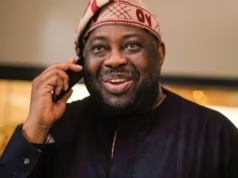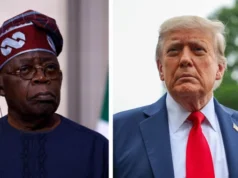Meta, the tech giant behind Facebook and Instagram, has taken another bold step in breaking language barriers for creators worldwide. On August 20, 2025, the company announced the launch of an AI-powered voice translation tool that allows creators to automatically dub their videos into another language, while maintaining their natural tone and even synchronising lip movements.
For years, one of the biggest frustrations for creators has been the limits of language. A funny skit in Lagos might go viral within Nigeria, but struggles to gain traction in Latin America because Spanish speakers cannot fully follow the humour. A beauty tutorial in English could inspire Nigerians and Ghanaians, but not reach Spanish-speaking audiences in Mexico, Argentina or Spain. With this new AI feature, Meta wants to close that gap—allowing every video to potentially become global content.
The new feature, which is starting with English and Spanish, enables creators to publish one version of a Reel, while Meta AI automatically generates a translated voice-over. Even better, creators can choose lip-sync, so that their mouth movements match the dubbed language, making it feel as natural as possible. Viewers will see a small label that reads “Translated with Meta AI,” giving transparency without distracting from the content.
This is more than just a technical update. It’s Meta’s strongest statement yet that AI will play a central role in content creation, distribution, and monetisation. And for Nigerian creators—who are part of one of the fastest-growing creator economies in the world—the timing couldn’t be better.
Table of Contents
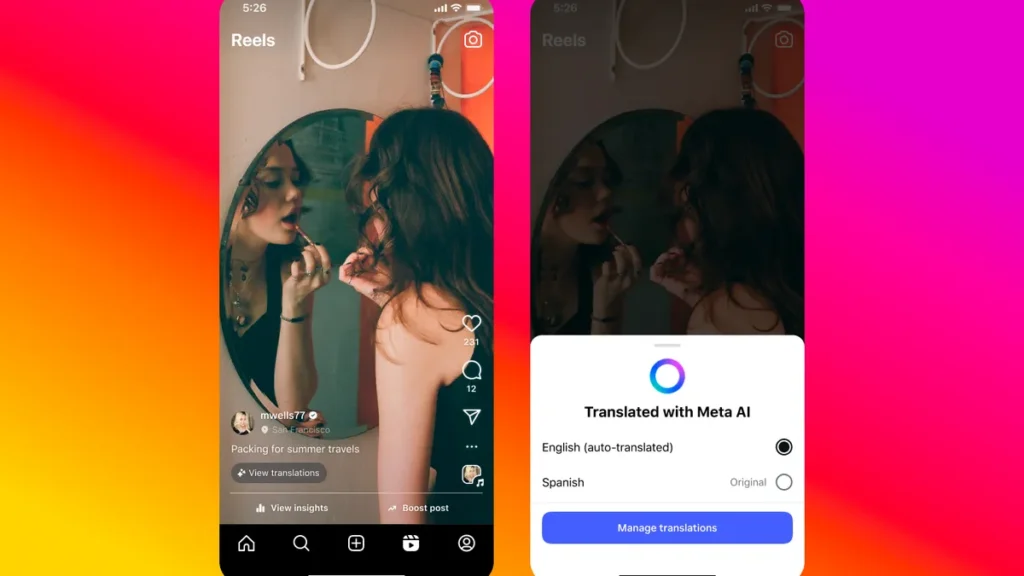
How the AI Translation Works and Who Can Use It
The translation process is simple. When a creator is about to publish a Reel, a new toggle appears: “Translate your voice with Meta AI.” Once enabled, the tool processes the spoken words in the video, generates a translated version in the target language, and overlays it in a voice that mimics the original speaker’s tone. If lip-sync is enabled, the AI also adjusts mouth movements to align with the translated speech.
Before posting, creators can preview the translated version. If they’re satisfied, they publish; if not, they can switch it off without affecting the original video. Meta has stressed that the original audio always remains intact, giving creators full control.
Currently, the feature supports only English ↔ Spanish, but Meta has made it clear that more languages will follow soon. Considering that Spanish is spoken by over 500 million people globally, the choice makes sense—it opens immediate access to one of the largest language markets.
In terms of eligibility:
- On Instagram, the feature is available to all public accounts in supported regions.
- On Facebook, creators must have at least 1,000 followers and be on Professional Mode.
Meta is also introducing Insights by Language, a new analytics tool that lets creators see how many views came from each language group. This is a significant step forward for creators who want to understand their audience and target content more effectively.
In addition, Facebook creators will have the option to upload up to 20 of their own dubbed audio tracks via the Meta Business Suite. This allows for manual control—ideal for professional creators or brands that prefer human-made translations.
To ensure accuracy, Meta recommends best practices such as filming face-on, avoiding background noise, and not blocking the mouth during speech. For videos with multiple speakers, each person should avoid speaking over the other, as this confuses the translation AI.
Why This Matters for Nigerian Content Creators
Nigeria has emerged as a powerhouse in Africa’s digital economy. With over 33 million active social media users, many of them content creators, the ability to reach wider audiences has direct implications for both influence and income.
Take the case of a Nigerian comedy skit maker. Today, their Reels might attract a few hundred thousand views within Nigeria, Ghana, and maybe parts of the UK where Nigerian diaspora communities are strong. But with Spanish dubbing, that same video could suddenly become accessible to audiences in Colombia, Chile, or Spain—markets that were previously difficult to penetrate. More views translate into more followers, stronger brand collaborations, and higher ad revenue.
This matters even more now that Nigerian creators have access to Facebook monetisation tools like Reels Ads and In-Stream Ads. Since July 2024, creators with at least 5,000 followers can start earning through ad placements. By enabling Spanish dubbing, a single video could potentially double or triple its reach, expanding earning opportunities far beyond the Nigerian market.
Consider this example:
- A Nigerian fashion influencer creates a tutorial in English.
- Using Meta AI, the video is auto-dubbed into Spanish.
- Spanish speakers in Mexico engage with it as though it were made for them.
- The influencer earns additional revenue through global ad views.
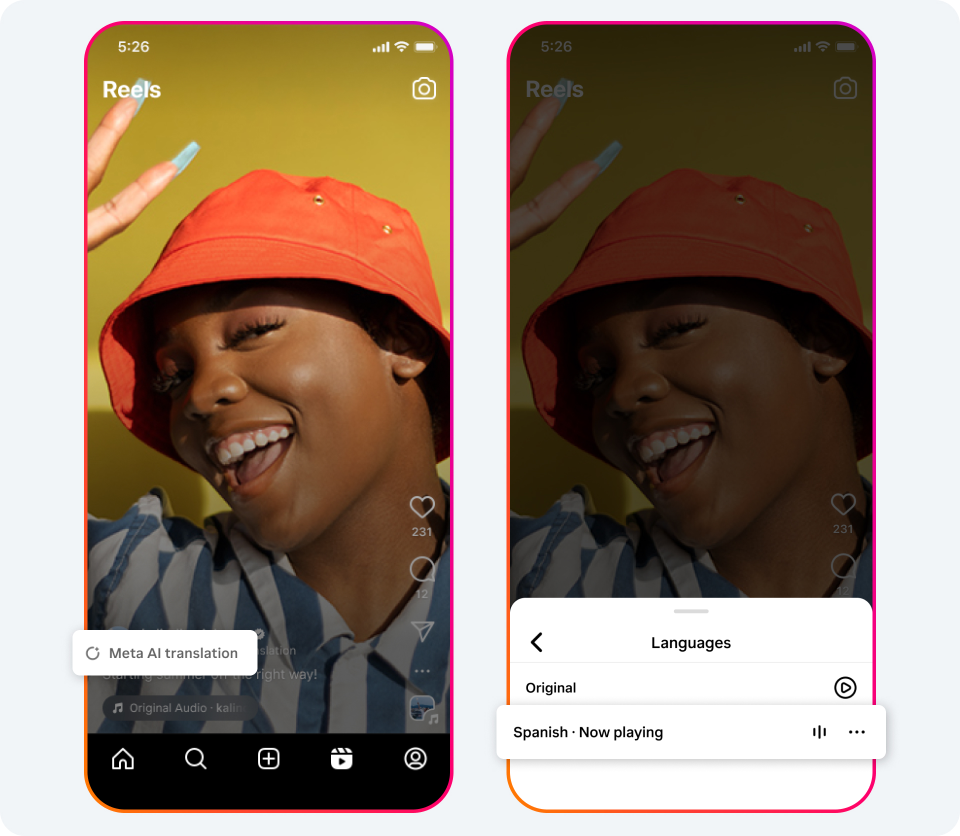
In effect, Meta has given Nigerian creators a passport to international markets without the usual costs of translation or production.
Beyond individual creators, brands in Nigeria also stand to gain. For instance, a local fintech startup could run a short Reel ad in English, and with Meta AI, instantly deliver it to Spanish-speaking audiences without paying for multiple production runs. This reduces costs while expanding customer reach.
However, not everything is rosy. Translation accuracy remains a concern. Some Nigerian Pidgin expressions, for example, may not translate smoothly into Spanish. A phrase like “no wahala” could be flattened into a bland equivalent, losing cultural flavour. Also, while lip-sync makes the translation more natural, small glitches could feel uncanny or distracting.
There are also ethical considerations. Simulated voices can raise fears of deepfakes or misuse. Meta tries to address this by labelling all AI-translated content, but as AI becomes more powerful, maintaining trust will require even stricter transparency.
Still, the benefits for Nigerian creators outweigh the risks. For a content economy that thrives on relatability and humour, Meta’s translation tool offers a way to carry that authenticity across borders.
What This Means for the Future of Content and AI
Meta’s new tool is not a standalone experiment—it is part of a much bigger AI strategy. In recent years, the company has invested heavily in SeamlessM4T, a multimodal model capable of translating speech to speech across nearly 100 languages, and No Language Left Behind, which supports over 200 languages. These efforts are laying the foundation for a world where language barriers almost disappear.
Looking ahead, several possibilities emerge:
- More Language Pairs: English-French, English-Arabic, and English-Swahili could be next. For African creators, especially, Swahili and Arabic would unlock entirely new audiences.
- Integration With Devices: Imagine wearing Meta’s Ray-Ban smart glasses and having real-time translation during live streaming. This could take global interactivity to new heights.
- Enterprise Applications: Schools could translate lectures instantly. Media houses could dub shows across languages cheaply. Businesses could reach global customers without language bottlenecks.
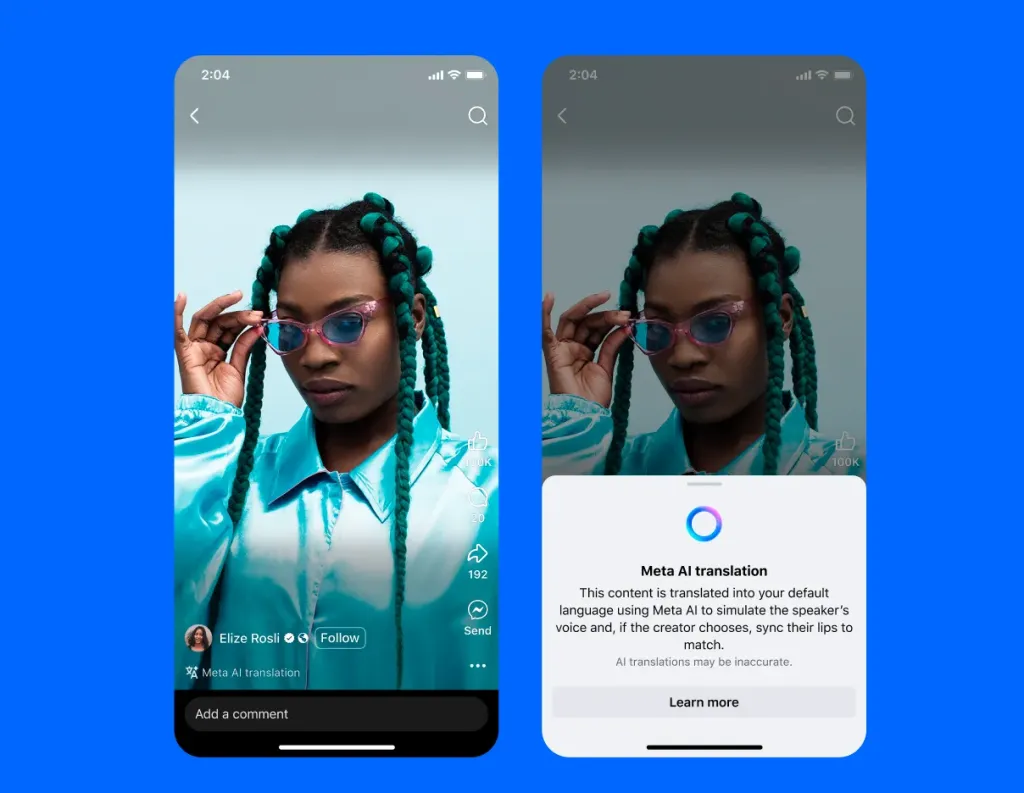
Meta is also restructuring its AI division, splitting responsibilities across research, infrastructure, and superintelligence. This restructuring hints at bigger ambitions: AI not just for social media, but for global communication and productivity tools.
For creators, though, the most immediate implication is clear: content is no longer local by default. A Reel recorded in Lagos can now resonate in Lima. A tutorial filmed in Abuja can trend in Madrid. The AI translation feature makes the internet feel a little more borderless.
But with this global reach comes responsibility. Creators must be mindful that jokes, cultural references, and tones that work in Nigeria might not carry the same meaning elsewhere. As such, cultural sensitivity will become as important as technical creativity.
Ultimately, Meta’s AI translation represents both a technological milestone and a cultural shift. By lowering the cost of multilingual content creation to almost zero, Meta has democratised access to global audiences. For Nigerian creators eager to showcase their creativity on the world stage, this is more than a feature—it is an opportunity to redefine influence, income, and international relevance.
Join Our Social Media Channels:
WhatsApp: NaijaEyes
Facebook: NaijaEyes
Twitter: NaijaEyes
Instagram: NaijaEyes
TikTok: NaijaEyes




